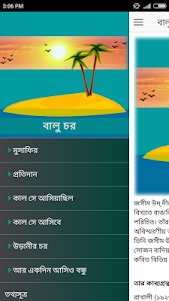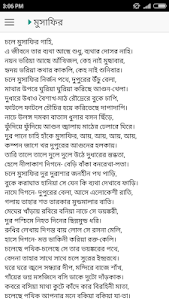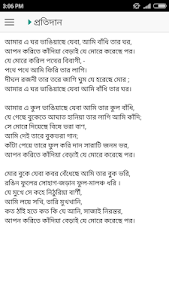hourglass_full Your download should start automatically in a few seconds...

Download পল্লীকবি জসীমউদ্দীন এর বালু চর_Latest Version.apk from Apk-Dl Server
Thank you for using Apk-Dl.com to download the apk file (পল্লীকবি জসীমউদ্দীন এর বালু চর_Latest Version.apk),
If the download doesn't start automatically in a few seconds, please click here to access the download URL directly.
Note: Download and save the apk file to your Android Phone's SD card and install it manually onto the Android device.
Description
তিনি ১৯০৩ সালের পহেলা জানুয়ারি ফরিদপুর জেলার তাম্বুলখানাগ্রামেজন্মগ্রহণ করেন। তার বাবার বাড়ি ছিল একই জেলার গোবিন্দপুরগ্রামে।বাবার নাম আনসার উদ্দিন মোল্লা। তিনি পেশায় একজন স্কুল শিক্ষকছিলেন।মা আমিনা খাতুন ওরফে রাঙাছুট।
জসীম উদ্ দীন ফরিদপুর ওয়েলফেয়ার স্কুল ও পরবর্তীতে ফরিদপুরজেলাস্কুল থেকে পড়ালেখা করেন। এখান থেকে তিনি তার প্রবেশিকাপরীক্ষায়১৯২১ সনে উত্তীর্ণ হন। তিনি কলকাতা বিশ্ববিদ্যালয় বাংলাথেকে বি. এ.এবং এম. এ. শেষ করেন যথাক্রমে ১৯২৯ এবং ১৯৩১ সনে।
১৯৩৩ সনে তিনি কলকাতা বিশ্ববিদ্যালয়ের ড. দীনেশ চন্দ্র সেনেরঅধীনেরামতনু লাহিড়ী গবেষণা সহকারী পদে যোগ দেন। এরপর ১৯৩৮ সনেঢাকাবিশ্ববিদ্যালয়ে বাংলা বিভাগের প্রভাষক হিসেবে যোগ দেন। ১৯৬৯সনেরবীন্দ্র ভারতী বিশ্ববিদ্যালয় কবিকে সম্মান সূচক ডি লিটউপাধিতেভূষিত করেন।
নকশী কাঁথার মাঠ
– জসীম উদ্ দীন
সখী দীন দুঃখীর যারে ছাড়া কেহ নাই
সেই আল্লার হাতে আজি আমি তোমারে সঁপিয়া যাই।
মাকড়ের আঁশে হস্তী যে বাঁধে, পাথর ভাসায় জলে
তোমারে আজিকে সঁপিয়া গেলাম তাঁহার চরণতলে।
তিনি ১৩ মার্চ ১৯৭৬ সনে ঢাকায় মৃত্যুবরণ করেন। পরে তাকে তাঁরনিজগ্রাম গোবিন্দপুরে দাফন করা হয়।
কবর
– জসীম উদ্ দীন
এইখানে তোর দাদীর কবর ডালিম গাছের তলে,
তিরিশ বছর ভিজায়ে রেখেছি দুই নয়নের জলে।
এতটুকু তারে ঘরে এনেছিনু সোনার মতন মুখ,
পুতুলের বিয়ে ভেঙে গেল বলে কেঁদে ভাসাইত বুক।
এখানে ওখানে ঘুরিয়া ফিরিতে ভেবে হইতাম সারা,
সারা বাড়ি ভরি এত সোনা মোর ছড়াইয়া দিল কারা।
সোনালী ঊষায় সোনামুখে তার আমার নয়ন ভরি,
লাঙ্গল লইয়া ক্ষেতে ছুটিতাম গাঁয়ের ও-পথ ধরি।
যাইবার কালে ফিরে ফিরে তারে দেখে লইতাম কত,
এ কথা লইয়া ভাবি-সাব মোর তামাশা করিত শত।
Jasimuddin (1 January 1903 – 13 March 1976; born Jasim Uddin)wasa Bengali poet, songwriter, prose writer, folklore collectorandradio personality. He is commonly known in Bangladesh as PolliKobi(The Rural Poet), for his faithful rendition of Bengalifolklore inhis works.
Jasimuddin was born in the village of Tambulkhana inFaridpurDistrict on 1 January 1903 in the house of his maternaluncle. Hisfather, Ansaruddin Mollah, was a school-teacher. MotherAminaKhatun (Rangachhut) received early education at FaridpurWelfareSchool. He matriculated from Faridpur Zilla School in1921.Jasimuddin completed IA from Rajendra College in 1924.Heobtainedhis BA degree in Bengali from the University of Calcutta in1929and his MA in 1931. From 1931 to 1937, Jasimuddin workedwithDinesh Chandra Sen as a collector of folk literature.Jasimuddin isone of the compilers of Purbo-Bongo Gitika (Ballads ofEastBengal). He collected more than 10,000 folk songs, some ofwhichhas been included in his song compilations Jari Gaan andMurshidaGaan. He also wrote voluminously on the interpretationandphilosophy of Bengali folklore.
Jasimuddin joined the University of Dhaka in 1938 as aLecturer.He left the university in 1944 and joined the DepartmentofInformation and Broadcasting. He worked there until hisretirementin 1962 as Deputy Director. He was an admirer of GuruMrityun JaySil
Jasimuddin started writing poems at an early age. As acollegestudent, he wrote the celebrated poem Kabar (The Grave), averysimple tone to obtain family-religion and tragedy. The poemwasplaced in the entrance Bengali textbook while he was stillastudent of Calcutta University.
Jasimuddin is noted for his depiction of rural life andnaturefrom the viewpoint of rural people. This had earned him fameasPolli Kobi (the rural poet). The structure and content ofhispoetry bears a strong flavor of Bengal folklore. His NokshiKantharMaath (Field of the Embroidered Quilt) is considered amasterpieceand has been translated into many differentlanguages.
In January 1903, the first day he was born in the villageofFaridpur district tambulakhana. His father was home atGobindapurvillage in the same district. Ansar Uddin Mollah,father's name.She was a school teacher by profession. Ranachutamother AminaKhatun alias.
Jasim ud Din Faridpur Welfare School, and later studiedfromFaridpur. From there, he passed the entrance examination in1921.B. Bengali from Calcutta University. Information. AndMA.Information. At the end of 1929 and in 1931 respectively.
Calcutta University in 1933, he said. Dinesh Chandra Sen,joinedas a research assistant under the Ramtanu Lahiri. In 1938 hejoinedthe Dhaka University as a lecturer in Bengali. Lit de poetRabindraBharati University in 1969 awarded the title ofrespect.
Hand-crafted Kanthar Field
- Jasim ud-Din
There is no religion without confidante afflicted allowed
Today I'm going sampiya the hands of Allah.
Elephant proper scales that bind, stone water bhasaya
His feet got excited sampiya saying.
He died at 13 in March 1976. Later, he was buried in hisnativevillage in Govindpur.
Grave
- Jasim ud-Din
Here's your grandmother's grave, under the pomegranate tree,
We have thirty years bhijaye two eyes water.
Enechinu gold as part of her face at home,
Bhasaita tears broke her heart to a puppet.
Here, there would have considered turning around aroundabout,
More scattered throughout the house, who gave muchgoldornaments.
Usaya sonamukhe grams of gold in my eye,
Chutitama-way village, and let him plow the field.
How many times laitama go back to see him,
I think my joke would take the hundred-sub.
Jasimuddin (1 January 1903 - 13 March 1976; born Jasim Uddin)wasa Bengali poet, songwriter, prose writer, folklore collectorandradio personality. He is commonly known in Bangladesh as PolliKobi(The Rural Poet), for his faithful rendition of Bengalifolklore inhis works.
Jasimuddin was born in the village of Tambulkhana inFaridpurDistrict on 1 January 1903 in the house of his maternaluncle. Hisfather, Ansaruddin Mollah, was a school-teacher. MotherAminaKhatun (Rangachhut) received early education at FaridpurWelfareSchool. He matriculated from Faridpur Zilla School in1921.Jasimuddin completed IA from Rajendra College in 1924.Heobtainedhis BA degree in Bengali from the University of Calcutta in1929and his MA in 1931. From 1931 to 1937, Jasimuddin workedwithDinesh Chandra Sen as a collector of folk literature.Jasimuddin isone of the compilers of Purbo-Bongo Gitika (Ballads ofEastBengal). He collected more than 10,000 folk songs, some ofwhichhas been included in his song compilations Jari Gaan andMurshidaGaan. He also wrote voluminously on the interpretationandphilosophy of Bengali folklore.
Jasimuddin joined the University of Dhaka in 1938 as aLecturer.He left the university in 1944 and joined the DepartmentofInformation and Broadcasting. He worked there until hisretirementin 1962 as Deputy Director. He was an admirer of GuruMrityun JaySil
Jasimuddin started writing poems at an early age. As acollegestudent, he wrote the celebrated poem Kabar (The Grave), averysimple tone to obtain family-religion and tragedy. The poemwasplaced in the entrance Bengali textbook while he was stillastudent of Calcutta University.
Jasimuddin is noted for his depiction of rural life andnaturefrom the viewpoint of rural people. This had earned him fameasPolli Kobi (the rural poet). The structure and content ofhispoetry bears a strong flavor of Bengal folklore. His NokshiKantharMaath (Field of the Embroidered Quilt) is considered amasterpieceand has been translated into many differentlanguages.





